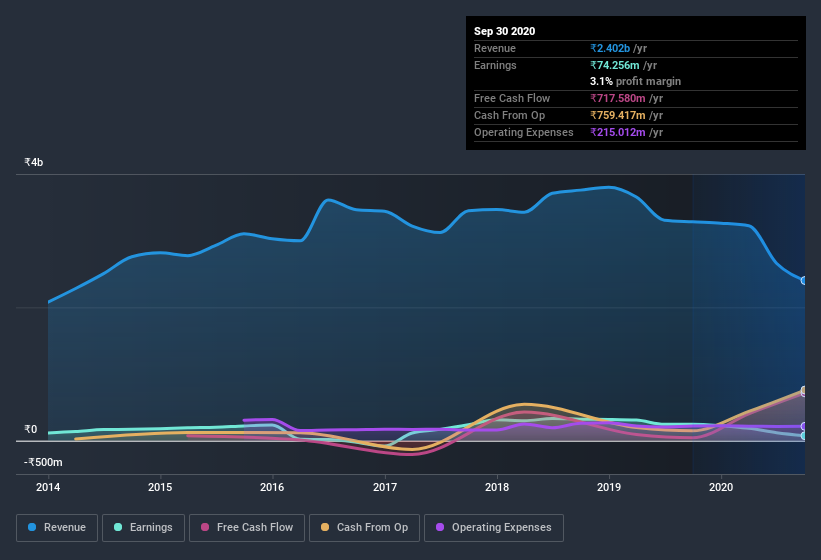We Think Waterbase's (NSE:WATERBASE) Statutory Profit Might Understate Its Earnings Potential

As a general rule, we think profitable companies are less risky than companies that lose money. Having said that, sometimes statutory profit levels are not a good guide to ongoing profitability, because some short term one-off factor has impacted profit levels. Today we'll focus on whether this year's statutory profits are a good guide to understanding Waterbase (NSE:WATERBASE).
While Waterbase was able to generate revenue of ₹2.40b in the last twelve months, we think its profit result of ₹74.3m was more important. Below, you can see that both its revenue and its profit have fallen over the last three years.
View our latest analysis for Waterbase

Importantly, statutory profits are not always the best tool for understanding a company's true earnings power, so it's well worth examining profits in a little more detail. As a result, we think it's well worth considering what Waterbase's cashflow (when compared to its earnings) can tell us about the nature of its statutory profit. Note: we always recommend investors check balance sheet strength. Click here to be taken to our balance sheet analysis of Waterbase.
Zooming In On Waterbase's Earnings
As finance nerds would already know, the accrual ratio from cashflow is a key measure for assessing how well a company's free cash flow (FCF) matches its profit. To get the accrual ratio we first subtract FCF from profit for a period, and then divide that number by the average operating assets for the period. The ratio shows us how much a company's profit exceeds its FCF.
Therefore, it's actually considered a good thing when a company has a negative accrual ratio, but a bad thing if its accrual ratio is positive. While it's not a problem to have a positive accrual ratio, indicating a certain level of non-cash profits, a high accrual ratio is arguably a bad thing, because it indicates paper profits are not matched by cash flow. Notably, there is some academic evidence that suggests that a high accrual ratio is a bad sign for near-term profits, generally speaking.
Waterbase has an accrual ratio of -0.40 for the year to September 2020. Therefore, its statutory earnings were very significantly less than its free cashflow. To wit, it produced free cash flow of ₹718m during the period, dwarfing its reported profit of ₹74.3m. Waterbase's free cash flow improved over the last year, which is generally good to see.
Our Take On Waterbase's Profit Performance
Happily for shareholders, Waterbase produced plenty of free cash flow to back up its statutory profit numbers. Based on this observation, we consider it possible that Waterbase's statutory profit actually understates its earnings potential! Unfortunately, though, its earnings per share actually fell back over the last year. At the end of the day, it's essential to consider more than just the factors above, if you want to understand the company properly. Keep in mind, when it comes to analysing a stock it's worth noting the risks involved. While conducting our analysis, we found that Waterbase has 2 warning signs and it would be unwise to ignore them.
Today we've zoomed in on a single data point to better understand the nature of Waterbase's profit. But there is always more to discover if you are capable of focussing your mind on minutiae. For example, many people consider a high return on equity as an indication of favorable business economics, while others like to 'follow the money' and search out stocks that insiders are buying. While it might take a little research on your behalf, you may find this free collection of companies boasting high return on equity, or this list of stocks that insiders are buying to be useful.
When trading Waterbase or any other investment, use the platform considered by many to be the Professional's Gateway to the Worlds Market, Interactive Brokers. You get the lowest-cost* trading on stocks, options, futures, forex, bonds and funds worldwide from a single integrated account. Promoted
Valuation is complex, but we're here to simplify it.
Discover if Waterbase might be undervalued or overvalued with our detailed analysis, featuring fair value estimates, potential risks, dividends, insider trades, and its financial condition.
Access Free AnalysisThis article by Simply Wall St is general in nature. It does not constitute a recommendation to buy or sell any stock, and does not take account of your objectives, or your financial situation. We aim to bring you long-term focused analysis driven by fundamental data. Note that our analysis may not factor in the latest price-sensitive company announcements or qualitative material. Simply Wall St has no position in any stocks mentioned.
*Interactive Brokers Rated Lowest Cost Broker by StockBrokers.com Annual Online Review 2020
Have feedback on this article? Concerned about the content? Get in touch with us directly. Alternatively, email editorial-team@simplywallst.com.
About NSEI:WATERBASE
Waterbase
Operates as an aquaculture company in India and internationally.
Mediocre balance sheet and overvalued.
Similar Companies
Market Insights
Community Narratives



